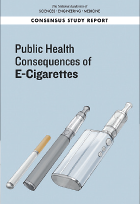A comprehensive new report from the National Academies of Sciences, Engineering, and Medicine (NASEM) provides some mixed signals in relation to a central question about the public health impact of electronic cigarettes: do they have a value in helping people quit smoking?
The report cited strong evidence to suggest that electronic cigarettes, or e-cigarettes, contain fewer harmful compounds than traditional cigarettes and that smokers who completely switch to e-cigarettes can reduce their health risks in the short term. However, there is no substantive evidence that e-cigarettes can actually aid in smoking cessation.
The role of e-cigarettes in smoking cessation has been a topic of much debate since these devices first came on the market. Some health professionals, for example, believe they can be a form of nicotine replacement therapy just like patches, while others worry that their resemblance to regular cigarettes reinforces negative smoking behaviors that make it harder to quit.
As noted in the NASEM report—which included the results of over 800 peer-reviewed studies—there are some data from observational studies that suggest e-cigarettes can promote smoking cessation, but evidence from more controlled studies is lacking.
The report identified just a handful of randomized clinical studies, and most of these showed only that e-cigarettes that contain nicotine are more effective at promoting smoking cessation than e-cigarettes without nicotine. There are insufficient data to know how these devices compare with current FDA-approved cessation products such as varenicline or nicotine patches.
People who completely transition from traditional cigarettes to e-cigarettes appear to have improved health outcomes in the short term (one year or less), the report concluded.
Douglas Ziedonis, M.D., M.P.H., a professor of psychiatry at the University of California, San Diego, was cautiously optimistic about this finding:
“The short-term benefits are encouraging, but remember that addiction is a long-term issue,” he told Psychiatric News.
Ziedonis said that while the concept of reducing harm in patients by encouraging switching to e-cigarettes is laudable, there are not enough data on the long-term behaviors of smokers who made the switch. “Many smokers, for example, will just flip-flop between tobacco products, and that is not helpful for their health,” he said.
Until more evidence about cessation efficacy and long-term health outcomes becomes available, Ziedonis recommends that psychiatrists continue to focus on cessation strategies with their patients, though the use of e-cigarettes as part of the process can and should be a topic of conversation.
Ziedonis said he believes the objective NASEM report will be a great resource for mental health professionals, even those who do not specialize in addiction psychiatry. “Smoking is associated with psychiatric disorders, and questions about e-cigarettes are only going to get more common in psychiatry offices,” he said. ■
“Public Health Consequences of E-Cigarettes” can be accessed
here.

